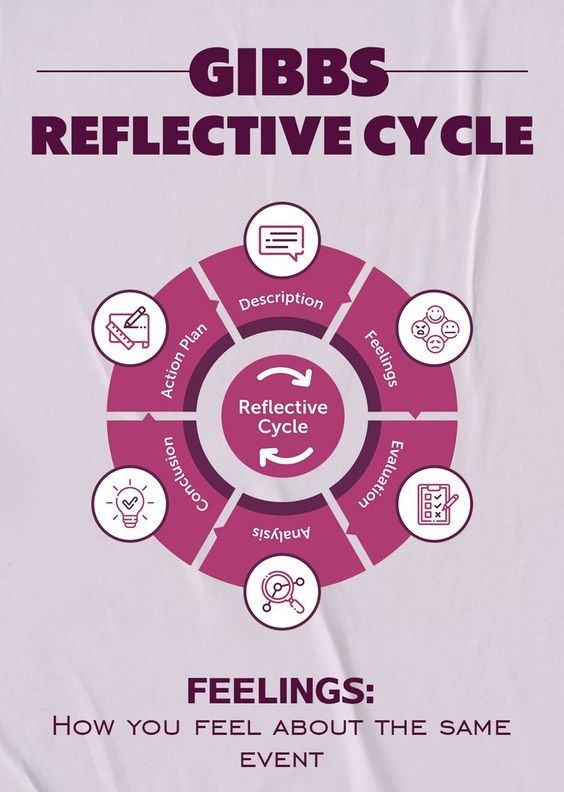
Table of Contents
The reflective essay is staple of nursing education that can present unique challenges to students. Writing a reflective nursing essay requires you to delve into your experiences, analyse your actions, and draw meaningful insights. Although the task can be daunting, crafting a compelling reflective essay can be a rewarding journey of self-discovery and professional growth for nursing students.
This guide provides a comprehensive framework to help you navigate the murky waters of reflection and produce a powerful reflective nursing essay that showcases your critical thinking and commitment to nursing.
Understanding the Reflective Nursing Essay
At its core, a reflective essay is a personal exploration of a specific event or situation within the context of your nursing practice. The essay is not just about recounting what happened but, focuses on dissecting your thoughts, feelings, and actions during that experience. The reflective nursing essay aims to demonstrate how you learned from the situation, how your understanding of nursing evolved, and how you will apply these insights to future practice.

The Foundation: Choosing a Powerful Experience:
The first step in writing a reflective essay is selecting a relevant and impactful experience. This should be an event that significantly impacted you, challenged your understanding, or forced you to reconsider your approach to patient care. Here are some of the questions that you should consider when choosing your experience:
- Significance: Did the event trigger significant emotions, raise ethical dilemmas, or force you to confront personal limitations?
- Growth Potential: Did the event offer opportunities for learning, skill development, or personal growth?
- Relevance to Nursing: Does the experience align with the core values and principles of the nursing practice?
The Structure: Building a Coherent Narrative
A well-structured reflective nursing essay follows a logical progression, allowing the reader to understand your journey of reflection and the insights that you gained from the experience. A common structure includes:
- Introduction: Briefly introduce the chosen experience and its significance to your nursing practice. Clearly state your thesis statement, outlining the key learning outcomes and the impact of the experience.
- Description of the Event: Provide a detailed account of the experience, focusing on the relevant aspects and using sensory details to create a vivid picture.
- Analysis and Reflection: This section is the heart of your essay. Here, you dissect the experience, analyzing your thoughts, feelings, and actions. Consider using theoretical frameworks like Gibbs’ Reflective Cycle or Kolb’s Experiential Learning Cycle to guide your analysis.
- Evaluation and Insights: Explore the significance of the experience, highlighting what you learned about yourself, your professional practice, and your understanding of nursing. Identify any personal growth or skills that you developed.
- Application and Future Practice: Discuss how the insights gained from the experience will shape your future nursing practice. Explain how you will apply these learnings to similar situations or how you will strive to avoid making the same mistakes.
- Conclusion: Summarize the key learning outcomes and reiterate the significance of the experience. Conclude with a forward-looking statement about your continued commitment to professional growth and patient care.

The Content: Weaving the Threads of Reflection
The content of your reflective nursing essay is crucial. It should demonstrate your ability to critically analyze your actions, connect theory with practice, and show your commitment to continuous improvement.
The following are key elements to include in the content of your reflection essay.
- Self-Awareness: Be honest and reflective about your emotions, biases, and limitations. Acknowledge any areas where you fell short and demonstrate your willingness to learn from those mistakes.
- Theoretical Frameworks: Use relevant nursing theories and models to support your analysis and provide a deeper understanding of the experience. This could include models of patient care, ethical frameworks, or communication theories.
- Evidence-Based Practice: Support your claims with evidence from relevant literature, research findings, or best practice guidelines. This demonstrates your commitment to staying up-to-date with the latest knowledge and applying it to your practice.
- Ethical Considerations: Explore any ethical dilemmas presented by the experience. Consider the ethical principles of autonomy, beneficence, non-maleficence, and justice. Analyze how these principles guided your decision-making and how you could have navigated the situation more effectively.
- Reflection on Personal Values: Reflect on how your personal values and beliefs influenced your actions during the experience. Consider how your values align with the professional values of nursing.
- Communication and Teamwork: Analyze your communication skills and teamwork abilities during the experience. Reflect on how you interacted with patients, colleagues, and other healthcare professionals.
The Language: Crafting a Compelling Narrative
The language used in crafting a reflective nursing essay is critical to making sure that your message reaches the audience as intended. Aim for clear, concise, and reflective prose. Avoid jargon and colloquialisms. Instead, use descriptive language to paint a vivid picture of the experience and convey your emotional response.
Here are some tips for crafting compelling language:
- First-person Perspective: Write in the first person to allow for a genuine and personal account of the experience.
- Active Voice: Use active voice to create a sense of immediacy and engagement.
- Show, Don’t Tell: Instead of simply stating your feelings, use vivid language to show the reader how you felt and reacted to the situation.
- Use Reflective Language: Use phrases like “I realized,” “This experience taught me,” or “I will strive to” to demonstrate your process of reflection and learning.
- Avoid Overgeneralizations: Focus on specific details and avoid making broad statements that lack evidence.
- Use Transitional Words and Phrases: Use transitional words and phrases to connect ideas and guide the reader through your narrative.
How to Craft a Powerful Reflective Nursing Essay
Writing a compelling reflective nursing essay requires time, effort, and thoughtful reflection. Following these steps can help you to navigate the process effectively:
- Brainstorm and Outline: Once you have chosen an experience, brainstorm key themes, insights, and learning outcomes. Then, create a detailed outline that guides the structure of your essay.
- Drafting and Revising: Write a first draft and allow yourself time to reflect on your writing. Then, revise your draft multiple times, focusing on clarity, coherence, and impact.
- Feedback and Editing: Seek feedback from a trusted mentor, professor, or peer. Incorporate their suggestions and edit your essay for grammar, punctuation, and style.
- Proofreading and Final Edits: Carefully proofread your essay for any errors. Make final edits and ensure your essay is polished and ready for submission.
The Reward: Beyond the Grade
Writing a reflective essay can be a challenging experience but, it is also very rewarding. It allows you to analyze your actions, gain valuable insights, and strengthen your commitment to patient care. The benefits of writing a compelling reflective nursing essay extends beyond the grade.
- Professional Growth: Reflection is essential for professional growth. It helps you identify areas for improvement, develop new skills, and become a more competent and compassionate nurse.
- Enhanced Patient Care: By reflecting on your experiences, you gain a deeper understanding of patients’ needs, perspectives, and how to provide optimal care.
- Ethical Development: Reflection fosters ethical awareness and helps you navigate complex ethical dilemmas in your practice.
- Self-Awareness: The process of reflection promotes self-awareness and helps you understand your strengths, weaknesses, and values as a nurse.
Get Professional Help with Writing a Reflective Nursing Essay
The key to writing a powerful reflective nursing essay lies in your willingness to delve into your experiences, analyze them with a critical lens, and draw meaningful insights that will shape your future. However, you may still need professional help with writing a reflective nursing essay. PhDNurseWriter offers the best essay writing services for undergraduate, Degree, Master’s and PhD. We can also help you with writing nursing research papers, case studies and dissertations.





